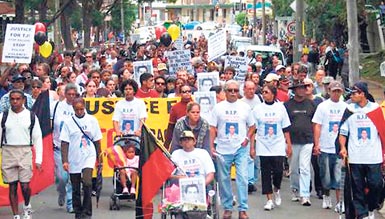Australia’s National Reconciliation Week, commemorated annually from May 27 to June 3 celebrates the rich culture and history of the First Australians, Aboriginal and Torres Strait Islander peoples and their strong contribution to Australian society today.
National Reconciliation Week began in 1996, when it was formally adopted as a national focus for all reconciliation activities between Indigenous and non-Indigenous Australians. However the idea has its roots in 1993 when 'faith communities' first began to hold an annual week of prayer for reconciliation.
 |
| A protest rally in support of aborigines’ rights in Australia |
National Reconciliation Week further coincides with two significant dates in the history of race relations in Australia. May 27 marks the anniversary of the 1967 Referendum, in which more than 90 per cent of Australians voted to remove clauses in the Australian Constitution which discriminated again Indigenous Australians, excluding them from citizenship. The 1967 Referendum was by far the most overwhelming 'Yes' vote at an Australian referendum ever recorded, more so even than Federation.
June 3 marks the anniversary of the Australian High Court judgement in the 1992 Mabo case. For the first time, this decision recognised the Native Title rights of Indigenous Australians as the original inhabitants of this continent and overturned the myth of terra nullius (empty land) upon which the colonisation of Australia was justified and which informed Australian legal practice for over a century.
This year, National Reconciliation Week has a third date to commemorate. National Reconciliation Week 2010 celebrates the ten year anniversary of the Bridge Walks in May 2000, which saw 300,000 Australians walk across the Sydney Harbour Bridge in support of Reconciliation: an event subsequently replicated in other cities and towns around the country. The theme for National Reconciliation Week this year, "Reconciliation: Lets see it through!" aims to highlight the achievements that have been made since the Bridge Walks of 2000, while acknowledging that there is still a long way to go.
On November 22, 2009, the Australian Government announced its support for the establishment of a national Indigenous representative body, the "National Congress of Australia's First Peoples (NCAFP)". Members of the National Congress of Australia's First Peoples have now been appointed and will soon begin representing Indigenous Australians in the policy arena.
This body is the first such organisation chosen entirely by Indigenous Australians to represent Indigenous Australians and will provide a central means through which Aboriginal and Torres Strait Islander people can engage directly with Government. Australia also celebrates the recent election of the first Indigenous Australian woman, Megan Davis, to the UN Permanent Forum on Indigenous Issues, following a successful lobbying campaign by the Australian Government.
On February 13, 2008, the Prime Minister delivered the National Apology to Australia's Indigenous peoples, and particularly the Stolen Generation for past Government policies that had resulted in profound grief, suffering and loss on the part of Indigenous Australians.
Australia as a nation is working towards resetting relations between Indigenous and non-Indigenous Australians and achieving long lasting and real reconciliation.
Courtesy the Ausralian High Commission |


